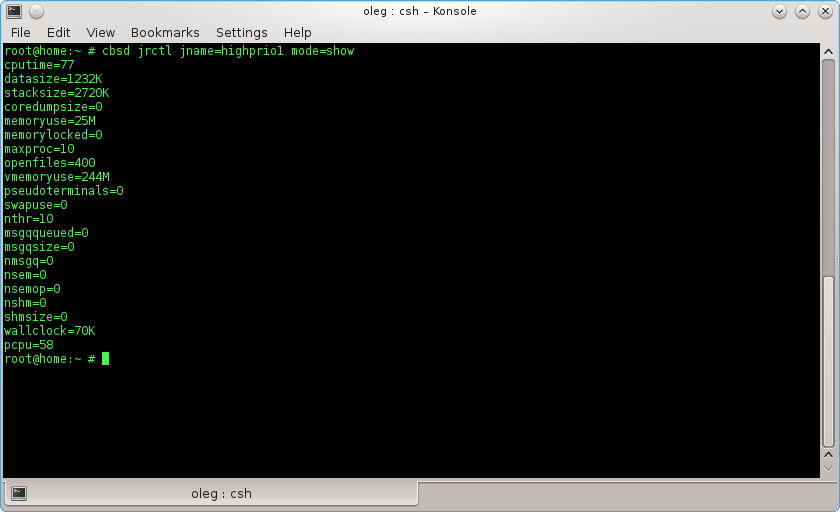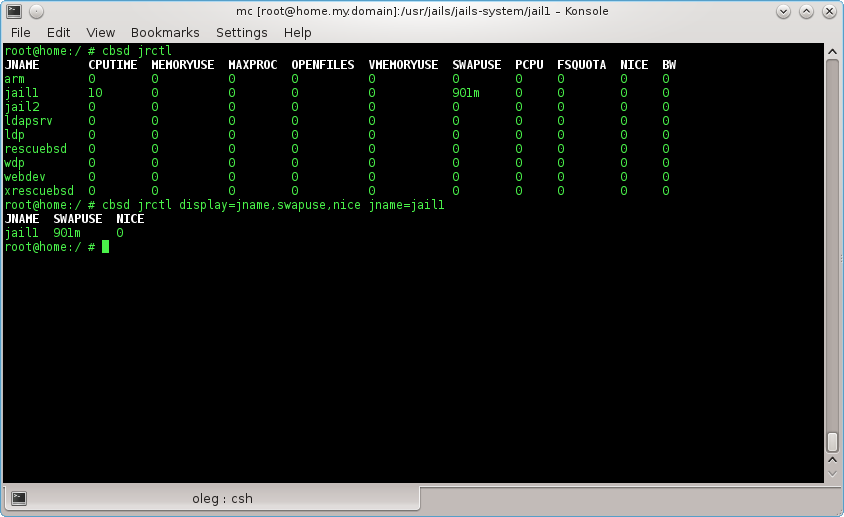2020-10 upd: we reached the first fundraising goal and rented a server in Hetzner for development! Thank you for donating !
Attention! Current pages describe CBSD version 13.0.x. If you are using an older version, please update first.
Attention! I apologize for the automatic translation of this text. You can improve it by sending me a more correct version of the text or fix html pages via GITHUB repository.
Jail limits control
jrctl, jrctl-tui commands
% cbsd jrctl
% cbsd jrctl-tui
Description:
CBSD supports many of FreeBSD's mechanisms for enforcing limits on a jail's resource usage, such as: zfs quota, rctl(8) и cpuset
CPU and Memory limits
The most popular limitation parameters in the installation are the limits on the consumption of CPU and RAM.
You can limit the CPU consumption via RACCT (cputime= and pcpu= parameters), or use a fixed number of cores allocation (via cpuset) via the cpu= parameter.
In our research and testing, cpu= is the most practical and demanded solution.
The cpu= parameter specifies how many cores the container can recycle. You can immediately create a container limited, for example, to one core:
% cbsd jcreate jname=myjail cpu=1 runasap=1
Besides limiting kernels, you may want to limit memory consumption via vmemoryuse=:
% cbsd jcreate jname=myjail cpu=1 vmemoryuse=1g runasap=1
Or, if you prefer to create environments through the CBSDfile, it might look like this:
jail_test2()
{
ip4_addr="DHCP"
host_hostname="test2.my.domain"
pkg_bootstrap="0"
# LIMIT/QUOTAs:
fsquota="10g" # set ZFS dataset quota
cpu="1" # only one vCPU allowed!
vmemoryuse="512m" # only 512MB RAM allowed!
}
File quotas
Floating file quotas are only possible for jails residing on ZFS-file system. The quota is regulated through the fsquota= parameter. For systems stored on UFS a similar restrictions can be enforced using an md(4)-based vnode file/image and making use of mdsize for the jail).
Renice prioritization
CBSD uses renice(8) to prioritize each jail's access to the CPU. This makes it possible to select different priorities on a per jail basis and give the most impoartant jails the highest share of CPU time. For example, you may want to have your distcc jail set to a low priority, give your web server medium and the jail hosting the databse the highest priority. The actual priorization is taken care of by nice which gets the value for each jail from jail rctl. The values set here correspond to the behavior of nice(1) — the lowest integer resulting in the highest priority.
Renice example:
1) Let's create an AMP jail and have it run a php script that performs some work (such as bench.zip taken from http://www.php-benchmark-script.com/). We then clone the jail, calling the first highprio1 and the second lowprio1. Using cbsd jrctl-tui we give the first the highest possible priority -20, and set the second jail to the lowest priority of 20. In addition we limit the jail to one core through cpuset with cbsd jconfig (single-core systems are hard to come by these days and smart schedulers do not allow for a clean experiment without taking this step ;-).
% cbsd jls display=jid,jname,ip4_addr,cpuset
16 highprio1 10.0.0.121/24 4
17 lowprio1 10.0.0.122/24 4
— jid 16 is the higher prioritised jail while jid 17 — is set to a lower priority. Both run on the fourth core.
make poll top state congestion php-fpm with JID output:
% export iter=1
% while [ 1 ]; do
printf "Iter: $iter" ;
iter=$((iter+1))
top -jab | grep php
sleep 1
done
We launch the script on both IPs at the same time:
% fetch -T 300 -o /dev/stdout http://10.0.0.121 & fetch -T 300 -o /dev/stdout http://10.0.0.122 &
[1] 65985
[2] 65986
--------------------------------------
| PHP BENCHMARK SCRIPT |
--------------------------------------
Start : 2014-01-06 16:28:59
Server : @10.0.0.121
PHP version : 5.4.23
Platform : FreeBSD
--------------------------------------
test_math : 12.870 sec.
test_stringmanipulation : 15.896 sec.
test_loops : 8.968 sec.
test_ifelse : 7.864 sec.
--------------------------------------
Total time: : 45.598 sec.
--------------------------------------
| PHP BENCHMARK SCRIPT |
--------------------------------------
Start : 2014-01-06 16:29:02
Server : @10.0.0.122
PHP version : 5.4.23
Platform : FreeBSD
--------------------------------------
test_math : 32.632 sec.
test_stringmanipulation : 18.053 sec.
test_loops : 6.323 sec.
test_ifelse : 5.504 sec.
--------------------------------------
Total time: : 62.512 sec.
[2] Done fetch -T 300 -o /dev/stdout http://10.0.0.122
[1] + Done fetch -T 300 -o /dev/stdout http://10.0.0.121
and we can soon observe the following output from top:
Iter: 1
65101 16 www 1 35 -20 32548K 11456K CPU4 4 0:35 20.56% php-fpm: pool www (php-fpm)
65587 17 www 1 52 20 32548K 11456K RUN 4 0:32 0.00% php-fpm: pool www (php-fpm)
Iter: 2
65101 16 www 1 60 -20 32548K 11456K RUN 4 0:36 25.98% php-fpm: pool www (php-fpm)
65587 17 www 1 42 20 32548K 11456K CPU4 4 0:33 2.10% php-fpm: pool www (php-fpm)
Iter: 3
65101 16 www 1 60 -20 32548K 11456K CPU4 4 0:36 26.27% php-fpm: pool www (php-fpm)
65587 17 www 1 94 20 32548K 11456K RUN 4 0:33 8.59% php-fpm: pool www (php-fpm)
Iter: 4
65101 16 www 1 61 -20 32548K 11456K CPU4 4 0:37 31.69% php-fpm: pool www (php-fpm)
65587 17 www 1 95 20 32548K 11456K RUN 4 0:34 9.47% php-fpm: pool www (php-fpm)
Iter: 5
65101 16 www 1 62 -20 32548K 11456K CPU4 4 0:37 35.60% php-fpm: pool www (php-fpm)
65587 17 www 1 95 20 32548K 11456K RUN 4 0:34 11.18% php-fpm: pool www (php-fpm)
Iter: 6
65101 16 www 1 64 -20 32548K 11456K CPU4 4 0:38 38.96% php-fpm: pool www (php-fpm)
65587 17 www 1 96 20 32548K 11456K RUN 4 0:34 12.79% php-fpm: pool www (php-fpm)
..
The jail with jid 16 is getting a larger share of the available CPU cycles and executes almost 1.5 times faster.
RACCT/RCTL framework
If your kernel has support RACCT/RCTL, you can set limits on the jail and watch the current statistics for jail resources. To do this, there is a command cbsd jrctl, which arguments
% cbsd jrctl mode=apply ...
and
% cbsd jrctl mode=unset ...
automatically called for the install or removal of limits when working jstart or jstop respectively. By command:
% cbsd jrctl mode=show
you can see current statistics on the jail resources consumed, which can be used to generate reports and graphs for loading jail, as well as the CBSD daemon used to generate recommendations on the need to add new resources and for overload warnings.
By command:
% cbsd jrctl
without arguments you cat see default limits on all jails. Through argument display you can specify the fields for output data. If display is not specified, the value takes from $workdir/etc/defaults/jrctl.conf file, which you can change at its discretion via $workdir/etc/jrctl.conf
You can edit the limits through
% cbsd jrctl-tui jname=jname
or, if you build a hosting and want to create limits on non-interactively, you can generate a file $workdir/$jname/jail.limits
By jrctl you can set the following limits jail:
a) All you can do a framework FreeBSD rctl(8):
cputime CPU time, in seconds
datasize data size, in bytes
stacksize stack size, in bytes
coredumpsize core dump size, in bytes
memoryuse resident set size, in bytes
memorylocked locked memory, in bytes
maxproc number of processes
openfiles file descriptor table size
vmemoryuse address space limit, in bytes
pseudoterminals number of PTYs
swapuse swap usage, in bytes
nthr number of threads
msgqqueued number of queued SysV messages
msgqsize SysV message queue size, in bytes
nmsgq number of SysV message queues
nsem number of SysV semaphores
nsemop number of SysV semaphores modified in a single semop(2) call
nshm number of SysV shared memory segments
shmsize SysV shared memory size, in bytes
wallclock wallclock time, in seconds

